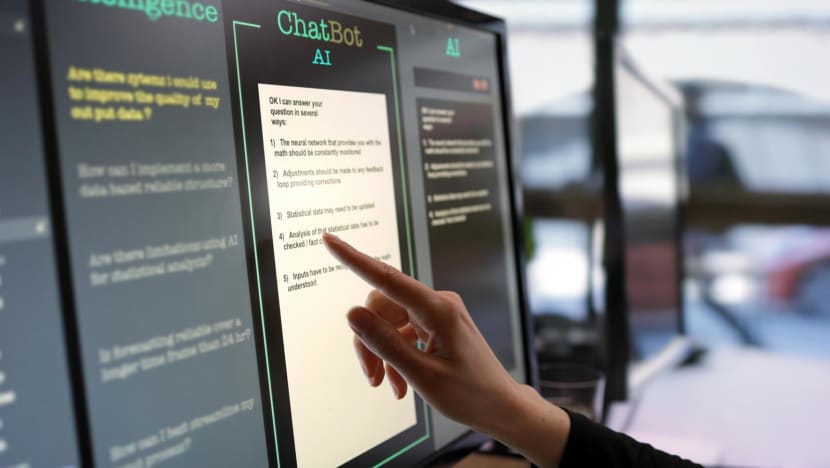Singapore proposes generative AI framework
The proposal seeks to set forth a "systematic and balanced approach" for generative AI concerns while facilitating innovation.

File photo of a woman operating an artificial intelligence chatbot on a touchscreen monitor. (Photo: iStock/Laurence Dutton)

This audio is generated by an AI tool.
SINGAPORE: Singapore has proposed a new framework for generative artificial intelligence (AI) and is now seeking views from the international community on it.
The Model AI Governance Framework for Generative AI expands on the existing framework covering traditional AI and which was last updated in 2020.
"With generative AI, there is a need to update the earlier model governance framework to holistically address new issues that have emerged," said the AI Verify Foundation (AIVF) and Infocomm Media Development Authority (IMDA) in a joint press release on Tuesday (Jan 16).
AIVF is a network that was launched last year, tapping the likes of IBM, Microsoft and Google to develop AI testing tools for responsible use and shape international standards.
The proposal seeks to set forth a "systematic and balanced approach" for generative AI concerns while facilitating innovation, and involves all key stakeholders like policymakers and the research community to "collectively do their part".
Feedback from the international community will be collated and used to support the finalisation of the Model AI Governance Framework for Generative AI in mid-2024, said the agencies.
What is the difference between traditional and generative AI?
With technology evolving as quickly as it is, it can be hard to distinguish between the different types of AI.
Traditional AI usually performs specific tasks intelligently, based on a particular set of data.
While these systems are able to learn and make decisions on fixed inputs, they cannot create anything new. They analyse and predict outcomes based on existing data.
Voice assistants such as Siri and recommendation engines on Netflix or streaming services are examples of traditional AI.
Generative AI, however, creates something new.
With the introduction of generative adversarial networks - or GANs - a type of machine learning algorithm, generative AI can create new images, videos, and audio.
ChatGPT, OpenAI's viral chatbot, is an example of generative AI.
According to Forbes, the main difference between traditional and generative AI lies in their capabilities and application.
"Traditional AI can analyse data and tell you what it sees, but generative AI can use that same data to create something entirely new."
FOSTERING A "TRUSTED ECOSYSTEM"
Both AIVF and IMDA said that generative AI has "significant transformative potential" beyond what traditional AI has been able to achieve, but noted this comes with risks.
"While it remains a dynamically developing space, there is growing global consensus that consistent principles are needed to create a trusted environment – one that enables end-users to use generative AI confidently and safely," said the agencies.
To help foster a "trusted ecosystem", the new framework aims to address nine dimensions:
- Accountability
- Data
- Trusted development and deployment
- Incident reporting
- Testing and assurance
- Security
- Content provenance
- Safety and alignment research and development (R&D)
- AI for public good
It integrates previous ideas from the discussion paper published by IMDA and technology firm Aicadium in June 2023, and draws on earlier work for guidance on suggested practices for safety evaluation of generative AI models.
Practical insights from ongoing evaluation tests will also been taken into account.
"Given the large volume of data involved in AI training, there is value in developing approaches to resolve these difficult issues in a clear and efficient manner," said AIVF and IMDA.
The proposal also addresses the need for AI to be directed for the public good, outlining four concrete touchpoints where AI can have beneficial, long-term effects.
These include serving the public in "impactful ways", with AI already powering many public services like health management systems in hospitals and helping to improve user experience.
AIVF and IMDA said that AI governance remains a nascent space and that building international consensus is key.
"As generative AI continues to develop and evolve, there is a need for global collaboration on policy approaches," added the two agencies.
"We hope that this serves as a next step towards developing a trusted AI ecosystem, where AI is harnessed for the public good, and people embrace AI safely and confidently."


















